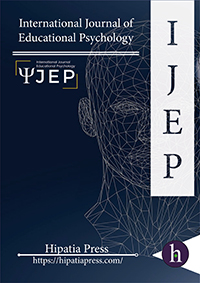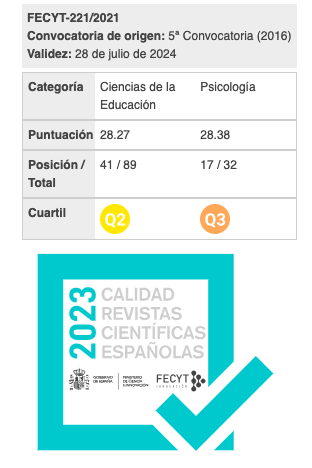Orientations to Happiness and University Students’ Engagement during the COVID-19 Era: Evidence from Six American Countries
Keywords:
Downloads
Abstract
Positive personal characteristics such as happiness or wellbeing can motivate students to elevate their school performance in higher education. Orientation to happiness is a construct that combines three sources of happiness: pleasure, meaning, and engagement, all of which have been identified as a predictor of university student’s engagement. However, most research in this area has been conducted during ideal situations or face-to-face education, and no cross-country research has been published examining the relationship between these two concepts during the COVID-19 era, where online education was predominant. This study aimed to investigate the relation between orientation to happiness and student engagement after twelve months of distance education in a sample of 1723 students from six American countries, including the USA, Mexico, El Salvador, Colombia, Peru, and the Dominican Republic. Results indicate that university student´s' engagement is influenced by the orientation to happiness. Further implications of these results are discussed.
Downloads
References
Abassi, M.S. Ahmed, N., Batool, S., Alshahrani, A., Saeed, S., Sarfaraz, S., Alhamdan, R., Fahim, V., & Abduljabbar, T. (2020). E-learning perceptions and satisfaction among health sciences students among the COVID-19 pandemic. Work 67, 549–556. https://doi.org/10.3233/WOR-203308
Google Scholar CrossrefAguilera-Hermida, A.P. (2020). College students’ use and acceptance of emergency online learning due to COVID-19. International Journal of Educational Research, 1, https://doi.org/10.1016/j.ijedro.2020.100011.
Google Scholar CrossrefAl-Maroof, R. S., Alhumaid, K., Akour, I., & Salloum, S. (2021). Factors that affect e-learning platforms after the spread of COVID-19: post acceptance study. Data, 6(5), 49. https://doi.org/10.3390/data6050049
Google Scholar CrossrefBeri, N. (2021). Orientation To Happiness Among Senior Secondary School Students Of Hilly Areas. Turkish Journal of Computer and Mathematics Education, 12(11), 7066-7075. https://turcomat.org/index.php/turkbilmat/article/view/7232/5877
Google Scholar CrossrefBesser, A., Flett, G. L., & Zeigler-Hill, V. (2020). Adaptability to a sudden transition to online learning during the COVID-19 pandemic: Understanding the challenges for students. Scholarship of Teaching and Learning in Psychology. https://doi.org/10.1037/stl0000198
Google Scholar CrossrefBoulton, C. A., Hughes, E., Kent, C., Smith, J. R., and Williams, H. T. (2019). Student engagement and wellbeing over time at a higher education institution. PLoS One 14:e0225770. https://doi.org/10.1371/journal.pone.0225770
Google Scholar CrossrefCamargo, C. P., Tempski, P. Z., Busnardo, F. F., Martins, M. A., & Gemperli, R. (2020). Online learning and COVID-19: a meta-synthesis analysis. Clinics (Sao Paulo, Brazil), 75, e2286. https://doi.org/10.6061/clinics/2020/e2286
Google Scholar CrossrefDatu, J. A. D., King, R. B., & Valdez, J. P. M. (2017). The academic rewards of socially-oriented happiness: Interdependent happiness promotes academic engagement. Journal of School Psychology, 61, 19-31. https://doi.org/10.1016/j.jsp.2016.12.004
Google Scholar CrossrefDogan, U. (2015). Student engagement, academic self-efficacy, and academic motivation as predictors of academic performance. Anthropologist 20, 553–561. https://doi.org/10.1080/09720073.2015.11891759
Google Scholar CrossrefDurón-Ramos, M.F., García-Vázquez, F.I. & Gálvez-Díaz, M.K. (2016). Traducción y validación de una escala para medir orientación a la felicidad en población mexicana [Translation and validation of a scale to measure the orientation to happiness in Mexican population]. Rev. Mex. Psicol. 2016, 468–469.
Google Scholar CrossrefDurón-Ramos, M. F., & García-Vázquez, F. (2018). Orientation to Happiness as Predictor of University Students' Engagement. International Journal of Evaluation and Research in Education, 7(4), 294-298. https://doi.org/10.11591/ijere.v7.i4.pp294-298
Google Scholar CrossrefDurón-Ramos, M. F., García-Vázquez, F. I., & Poggio-Lagares, L. (2018). Positive psychosocial factors associated with the university student's engagement. The Open Psychology Journal,11, 292-300. http://doi.org/10.2174/1874350101811010292
Google Scholar CrossrefDurón-Ramos, M. F., Mojica-Gómez, P. A., Villamizar-Gomez, K., & Chacón-Andrade, E. R. (2020). Impact of Positive Personal Traits on University Student Engagement in Mexico, Colombia, and El Salvador. In Frontiers in Education (Vol. 5, p. 12). https://doi.org/10.3389/feduc.2020.00012
Google Scholar CrossrefElwick, A., & Cannizzaro, S. (2017). Happiness in higher education. Higher Education Quarterly, 71(2), 204-219. https://doi.org/10.1111/hequ.12121
Google Scholar CrossrefFredricks, J. A., Blumenfeld, P. C., and Paris, A. H. (2004). School engagement: potential of the concept, state of the evidence. Rev. Educ. Res. 74, 59–109. https://doi.org/10.3102/0034654307400105
Google Scholar CrossrefFredricks, J. A. (2011). Engagement in school and out-of-school contexts: A multidimensional view of engagement. Theory into practice, 50(4), 327-335.
Google Scholar CrossrefGöksu, İ., Ergün, N., Özkan, Z., & Sakız, H. (2021). Distance education amid a pandemic: Which psycho‐demographic variables affect students in higher education?. Journal of Computer Assisted Learning. https://doi.org/10.1111/jcal.12544
Google Scholar CrossrefGutiérrez, M., Tomás, J. M., Barrica, J. M., and Romero, I. (2017). Influencia del clima motivacional en clase sobre el compromiso escolar de los adolescentes y su logro académico [Influence of the motivational class climate on adolescents’ school engagement and their academic achievement]. Enseñ. Teach 35, 21–37. https://doi.org/10.14201/et20173512137
Google Scholar CrossrefHeffner, A. L., & Antaramian, S. P. (2015). The Role of Life Satisfaction in Predicting Student Engagement and Achievement. Journal of Happiness Studies, 17(4), 1681–1701. https://doi.org/10.1007/s10902-015-9665-1
Google Scholar CrossrefHornsey, M. J., Bain, P. G., Harris, E. A., Lebedeva, N., Kashima, E. S., Guan, Y., ... & Blumen, S. (2018). How much is enough in a perfect world? Cultural variation in ideal levels of happiness, pleasure, freedom, health, self-esteem, longevity, and intelligence. Psychological science, 29(9), 1393-1404. https://doi.org/10.1177/0956797618768058
Google Scholar CrossrefJelas, Z. M., Azman, N., Zulnaidi, H., and Ahmad, N. A. (2016). Learning support and academic achievement among Malaysian adolescents: the mediating role of student engagement. Learn. Environ. Res. 19, 221–240. https://doi.org/10.1007/s10984-015-9202-5
Google Scholar CrossrefKahu, E. R., Picton, C., & Nelson, K. (2020). Pathways to engagement: A longitudinal study of the first-year student experience in the educational interface. Higher Education, 79(4), 657-673. https://doi.org/10.1007/s10734-019-00429-w
Google Scholar CrossrefKauffman, H. (2015). A review of predictive factors of student success in and satisfaction with online learning. Research in Learning Technology, 23. https://doi.org/10.3402/rlt.v23.26507
Google Scholar CrossrefKavetsos, G., Dimitriadou, M., & Dolan, P. (2014). Measuring happiness: context matters. Applied Economics Letters, 21(5), 308–311. https://doi.org/10.1080/13504851.2013.856994
Google Scholar CrossrefLam, S. F., Wong, B. P., Yang, H., & Liu, Y. (2012). Understanding student engagement with a contextual model. In Handbook of research on student engagement (pp. 403-419). Springer, Boston, MA.
Google Scholar CrossrefLam, S., Jimerson, S., Shin, H., Cefai, C., Veiga, F. H., Hatzichristou, C., … Zollneritsch, J. (2015). Cultural universality and specificity of student engagement in school: The results of an international study from 12 countries. British Journal of Educational Psychology, 86(1), 137–153. https://doi.org/10.1111/bjep.12079
Google Scholar CrossrefLawson, M. A., & Lawson, H. A. (2013). New conceptual frameworks for student engagement research, policy, and practice. Review of Educational Research, 83(3), 432-479. https://doi.org/10.3102/0034654313480891
Google Scholar CrossrefLibbrecht, N., Lievens, F., Carette, B., and Côté, S. (2014). Emotional intelligence predicts success in medical school. Emotion 14, 64–73. https://doi.org/10.1037/a0034392
Google Scholar CrossrefLovelace, M. D., Reschly, A. L., & Appleton, J. J. (2017). Beyond school records: The value of cognitive and affective engagement in predicting dropout and on-time graduation. Professional School Counseling, 21(1), 1096-2409. https://doi.org/10.5330/1096-2409-21.1.70
Google Scholar CrossrefMaroco, J., Maroco, A. L., Campos, J. A. D. B., and Fredricks, J. A. (2016). University student’s engagement: development of the University Student Engagement Inventory (USEI). Psicologia 29(21). https://doi.org/10.1186/s41155-016-0042-8
Google Scholar CrossrefMayerova, S. H., and Rosicka, Z. (2015). E-Learning Pros And Cons: Active Learning Culture?. Social and Behavioral Sciences, 191, 958 – 962. https://doi.org/10.1016/j.sbspro.2015.04.702
Google Scholar CrossrefMeyer, K. A. (2014). Student engagement in online learning: What works and why. ASHE higher education report, 40(6), 1-114. https://doi.org/10.1002/aehe.20018
Google Scholar CrossrefMheidly, N., Fares, M. Y., & Fares, J. (2020). Coping With Stress and Burnout Associated With Telecommunication and Online Learning. Frontiers in public health, 8, 574969. https://doi.org/10.3389/fpubh.2020.574969
Google Scholar CrossrefMichalos, A. C. (2017). Education, happiness and wellbeing. In Connecting the quality of life theory to health, well-being and education (pp. 277-299). Springer, Cham. https://doi.org/10.1007/978-3-319-51161-0_12
Google Scholar CrossrefO’Keefe, T. (2017). The Birth of Hedonism: The Cyrenaic Philosophers and Pleasure as a Way of Life. Ancient philosophy, 37(1), 185-192. https://doi.org/10.5840/ancientphil201737110
Google Scholar CrossrefOriol-Granado, X., Mendoza-Lira, M., Covarrubias-Apablaza, C. G., and Molina-López, V. M. (2017). Positive emotions, autonomy support and academic performance of university students: the mediating role of academic engagement and self-efficacy. Rev. Psicodidáctica 22, 45–53. https://doi.org/10.1387/revpsicodidact.14280
Google Scholar CrossrefOzkan, S. and Koseler, R. (2009). Multi-dimensional students’ evaluation of e-learning systems in the higher education context: An empirical investigation. Computers & Education, 53, 1285-1296. https://doi.org/10.1016/j.compedu.2009.06.011
Google Scholar CrossrefPark, N., Peterson, C., & Ruch, W. (2009). Orientations to happiness and life satisfaction in twenty-seven nations. Journal of Positive Psychology, 4(4), 273–279. http://dx.doi.org/10.1080/17439760902933690
Google Scholar CrossrefPekrun, R., & Linnenbrink-Garcia, L. (2012). Academic emotions and student engagement. In Handbook of research on student engagement (pp. 259-282). Springer, Boston, MA.
Google Scholar CrossrefPeterson, C., Park, N. y Seligman, E. (2005). Orientations to happiness and life satisfaction: the full life versus the empty life. Journal of Happiness Studies. 2; pp: 25-41. https://doi.org/10.1007/s10902-004-1278-z
Google Scholar CrossrefReschly, A. L., & Christenson, S. L. (2012). Jingle, jangle, and conceptual haziness: Evolution and future directions of the engagement construct. In Handbook of research on student engagement (pp. 3-19). Springer, Boston, MA.
Google Scholar CrossrefSalanova, M., Martínez, I., Bresó, E., Llorens, S., and Grau, R. (2005). Bienestar psicológico en estudiantes universitarios: facilitadores y obstaculizadores del desempeño académico [Psychological well-being in university students: facilitators and impeding academic performance]. Ann Psicol.Spain 21, 170–180. https://revistas.um.es/analesps/article/view/27261
Google Scholar CrossrefSattar, M. A., Rasheed, M. I., Khan, I. U., Tariq, H., and Iqbal, J. (2017). Why adaptable individuals perform better: the role of orientation to happiness. Austr. J. Career Dev. 26, 134–141. https://doi.org/10.1177/1038416217724516
Google Scholar CrossrefSchneider, S. L., & Council, M. L. (2021). Distance learning in the era of COVID-19. Archives of dermatological research, 313(5), 389-390. https://doi.org/10.1007/s00403-020-02088-9
Google Scholar CrossrefVonderwell, S., & Zachariah, S. (2005). Factors that influence participation in online learning. Journal of Research in Technology in Education, 38(2): 213-230. https://doi.org/10.1080/15391523.2005.10782457
Google Scholar CrossrefYang, Y., Li, P., Fu, X., & Kou, Y. (2017). Orientations to happiness and subjective well-being in Chinese adolescents: The roles of prosocial behavior and internet addictive behavior. Journal of Happiness Studies, 18(6), 1747-1762. https://doi.org/10.1007/s10902-016-9794-1
Google Scholar CrossrefZhong, Y., Busser, J., Shapoval, V., & Murphy, K. (2021). Hospitality and tourism student engagement and hope during the COVID-19 pandemic. Journal of Hospitality & Tourism Education, 1-13. https://doi.org/10.1080/10963758.2021.1907197
Google Scholar CrossrefDownloads
Published
Almetric
Dimensions
How to Cite
Issue
Section
License
Copyright (c) 2022 Maria Durón-Ramos, Miguel Perez, Edgardo René Chacón-Andrade

This work is licensed under a Creative Commons Attribution 4.0 International License.
All articles are published under Creative Commons copyright (CC BY). Authors hold the copyright and retain publishing rights without restrictions, but authors allow anyone to download, reuse, reprint, modify, distribute, and/or copy articles as the original source is cited.
















